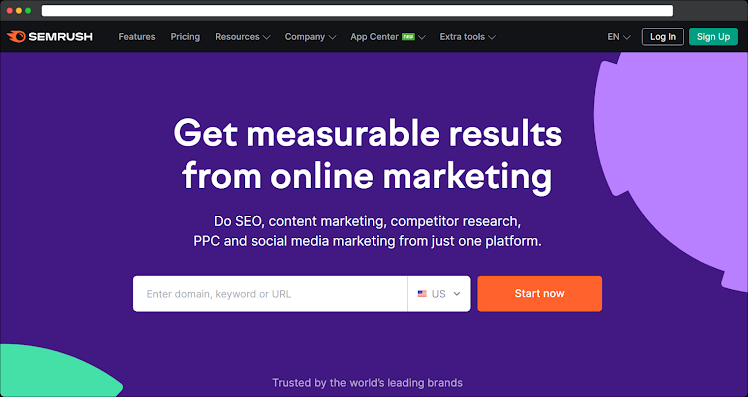SEMRUSH: TOP SEO TOOLS FACTORY FOR ADVANCED SEO RESEARCH & IMPROVEMENT OF SERP RANKINGS
Semrush is one of the most versatile & powerful tools factory for advanced SEO research in the market that helps digital marketers with various aspects of online marketing, such as SEO, PPC, content, social media, and competitive research. It offers a comprehensive suite of features that can help you optimize your website, analyze your competitors, and boost your online visibility.
But how do you use Semrush effectively?
In this blog post, we will explore Semrush features, working, pricing & benefits, pros, cons and how it can benefit your online marketing strategy effectively.

- INTRODUCTION
- SEMRUSH FEATURES
- SETTING UP AN ACCOUNT
- WORKING OF VARIOUS TOOLS
- PRICING & BENEFITS
- PROS & CONS
- CONCLUSION
TOP FEATURES OF SEMRUSH
1. Keyword Research: Semrush allows you to find the best keywords for your website, based on the search volume, difficulty, competition, and trends. You can also analyze the keywords of your competitors and discover new opportunities for organic and paid traffic. For example, you can use the Keyword Magic Tool to generate thousands of keyword ideas for any niche, or the Keyword Gap Tool to compare your keyword portfolio with your competitors and find missing keywords.

2. Site Audit: Semrush helps you identify and fix the technical and SEO issues on your website, such as broken links, duplicate content, slow loading speed, and more. You can also monitor your site's health and performance over time and get actionable recommendations for improvement. For example, you can use the Site Audit Tool to crawl your website and get a comprehensive report on its SEO health, or the On Page SEO Checker to get personalized suggestions on how to optimize your web pages.

3. Content Marketing: Semrush helps you create and optimize content that attracts and engages your audience, based on the topics, keywords, and questions that they are searching for. You can also analyze the content of your competitors and find gaps and opportunities to outrank them. For example, you can use the Topic Research Tool to generate content ideas for any topic, or the SEO Content Template to get a template for creating SEO-friendly content.
4. Backlink Analysis: Semrush helps you monitor and improve your backlink profile, by showing you the sources, types, and quality of the links pointing to your website. You can also find and remove toxic links that may harm your rankings, and discover new link building opportunities. For example, you can use the Backlink Analytics Tool to get a detailed overview of your backlink profile, or the Backlink Audit Tool to detect and remove harmful links.

5. Social Media Marketing: Semrush helps you manage and grow your social media presence, by allowing you to schedule posts, track engagement, analyze sentiment, and benchmark your performance against your competitors. You can also create and run social media ads campaigns from within Semrush. For example, you can use the Social Media Poster to plan and publish posts across multiple platforms, or the Social Media Ads Tool to create and manage ads on Facebook and Instagram.
6. Competitive Research: Semrush helps you spy on your competitors and uncover their online marketing strategies, such as their traffic sources, keywords, ads, content, backlinks, and social media activities. You can also compare your website with up to five competitors and see how you stack up against them. For example, you can use the Traffic Analytics Tool to get insights into your competitors' website traffic 'or' the Domain Overview Tool to get a snapshot of their online presence.

7. Data Transportation: Semrush allows users to access its data and tools through various methods, such as:
- Semrush dashboard: This is the main interface where users can see an overview of their projects, domains, keywords, and reports. Users can also create and manage their campaigns, audits, and analyses from here.
- Semrush reports: These are detailed reports that show various metrics and insights for a specific domain, keyword, or topic. Users can customize and export these reports as PDF or CSV files.
- Semrush tools: These are specialized tools that help users to perform specific tasks, such as keyword research, competitor analysis, site audit, content analysis, social media monitoring, etc. Users can access these tools from the dashboard or the reports.
- Semrush API: This is a programmatic way of accessing Semrush data and tools. Users can integrate Semrush with their own applications or third-party platforms using the API.
- Semrush widgets: These are small graphical elements that display Semrush data on external websites or platforms. Users can embed these widgets on their own websites or blogs to showcase their online performance or compare themselves with their competitors.
These are some of the features of Semrush that can help you take your online marketing to the next level. If you want to learn more about Semrush and how it can help you achieve your online marketing goals, you can signup for a free trial or a paid plan today.
SETTING UP YOUR SEMRUSH ACCOUNT
1. The first step to using Semrush is to create an account. You can sign up for a free trial or choose a paid plan that suits your needs. The free trial gives you access to most of the features, but with some limitations on the number of queries, projects, and reports you can run. The paid plans offer more flexibility and functionality, as well as additional tools such as content marketing, social media, and PPC.
2. Once you have created your account, you can log in to your Semrush dashboard. Here, you can see an overview of your domain's performance, such as organic traffic, keywords, backlinks, and position changes. You can also enter any domain, keyword, or URL in the search bar to get instant data and analysis.

Semrush works by collecting and analyzing data from millions of websites and online sources. SEMrush has a huge database of over 24 billion keywords, 808 million domains, 140 geodatabases, and 55+ tools. SEMrush updates its data every day to provide the most accurate and up-to-date information.
WORKING OF VARIOUS SEMRUSH TOOLS
1. SEMRUSH FOR KEYWORD RESEARCH
One of the most important aspects of SEO is keyword research. Keyword research helps you find the best keywords to target for your website, based on their search volume, difficulty, competition, and relevance. Semrush offers several tools to help you with keyword research, such as:
- Keyword Magic Tool: This tool helps you generate thousands of keyword ideas for any topic or niche. You can filter the keywords by various criteria, such as broad match, exact match, phrase match, or question. You can also group the keywords by topic and export them to other Semrush tools. For example, if you enter "socks" as a topic, you can see that it has 716,613 keywords in total. You can then filter them by "Questions" type and see that there are numerous questions related to socks. Some of these questions may be "what are socks", "type of socks should we wear", "how much do socks cost" etc.

- Keyword Gap: This tool helps you compare your keywords with your competitors' keywords and find gaps and opportunities. You can see which keywords you are ranking for and which ones you are missing out on. You can also see which keywords your competitors are ranking for and which ones you can target. For example, if you enter your domain and three of your competitors' domains in this tool, you can see a table that shows the common and unique keywords for each domain. You can then sort the table by various metrics such as volume or difficulty and find the keywords that have high potential for your website.
It is the process of analyzing your competitors' websites and strategies to identify their strengths and weaknesses. By doing so, you can learn from their successes and avoid their mistakes. You can also find new opportunities and gaps in the market that you can exploit.
SEMrush helps you with competitor analysis by providing you with:
- Domain Overview: This feature gives you a comprehensive overview of any domain's online performance. You can see the domain's organic and paid traffic, keywords, backlinks, authority score, top pages, top countries, etc. You can also compare up to five domains side by side and see their common and unique metrics.
- Traffic Analytics: This feature allows you to estimate any website's traffic sources, audience behavior, geographic distribution, and device usage. You can also compare up to five websites and see their traffic share, overlap, and quality.
- Organic Research: This feature enables you to analyze any website's organic search performance. You can see the website's organic keywords, positions, traffic, SERP features, competitors, etc. You can also track the website's ranking changes over time and see its historical data.

- Advertising Research: This feature lets you analyze any website's paid search performance. You can see the website's paid keywords, ads, traffic, CPC, competitors, etc. You can also track the website's ad changes over time and see its historical data.
- Backlink Analytics: This feature helps you analyze any website's backlink profile. You can see the website's total number of backlinks, referring domains, authority score, anchor texts, top-level domains, etc. You can also see the new and lost backlinks over time and monitor your backlink health.
Site audit is the process of checking your website for technical issues that may affect its performance and user experience. These issues include **broken links**, **duplicate content**, **slow loading speed**, **low mobile-friendliness**, **missing meta tags**, **crawl errors**, **security issues**, **HTTPS implementation**, **structured data errors**, **AMP issues** etc.

SEMRUSH PRICING & BENEFITS
Semrush is a popular SEO tool that offers various features for keyword research, competitor analysis, content marketing, and more. However, it also has some drawbacks that users should be aware of. Here are some pros and cons of Semrush:
Pros:
- It has a large and updated database of keywords, domains, and backlinks.
- It provides comprehensive and detailed reports on various aspects of SEO, such as traffic, rankings, visibility, etc.
- It has a user-friendly interface and a lot of integrations with other tools and platforms.
- It offers a free trial and various pricing plans to suit different needs and budgets.
- It has a powerful and versatile keyword tool that allows users to find and analyze keywords for different purposes, such as SEO, PPC, content, etc.
- It has a unique and innovative feature called Topic Research that helps users discover and create relevant and engaging content for their audience.
- It has a competitive intelligence tool that helps users spy on their competitors' strategies, tactics, and performance.
Cons:
- It may require efforts to master its advanced features and functions.
SEMRUSH REVIEWS (BY REAL CLIENTS)
Average Score Rating of Semrush on "G2 - Top Reviews Platform" from 1756 clients including Professionals, Enterprises & SMBs is "4.5" out of "5".

































0 Comments